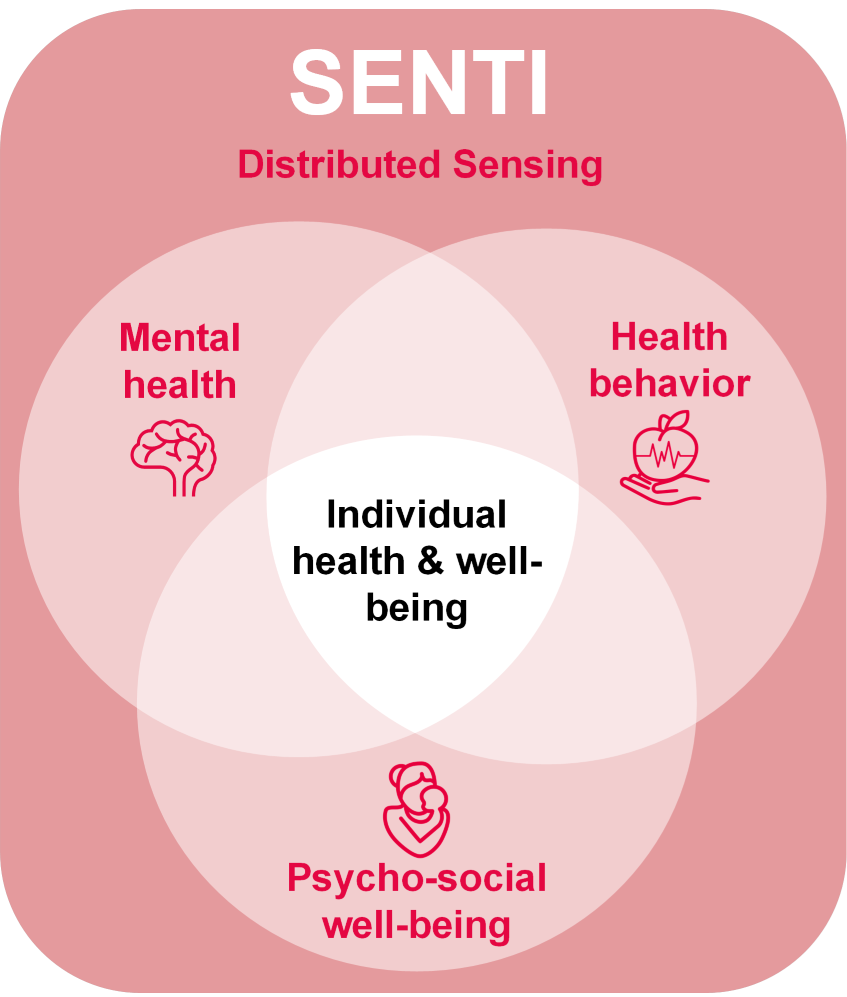Using digital sensing to predict human health and well-being – SENTI
Overview
Digitalization presents both opportunities and challenges for human health and well-being. While smartphone use has the potential to enhance psychological well-being and to support health behavior, problematic usage can have adverse effects on physical and mental health. In this context, mobile sensing technology (e.g. through smartphones, smartwatches, and wearables), offers a unique opportunity to reach individuals in their daily lives. It provides indicators for measuring and predicting psychosocial states and behaviors, encompassing affective states, mental health, social interactions, and health behaviors. The SENTI project aims to leverage mobile sensing technology to better understand and predict changes in health and well-being. Ultimately, its goal is to enable individuals to leverage digital technology to monitor and promote their health and well-being in the long-term.

SENTI sub-projects
The project is divided into four sub-projects: Three empirical projects that showcase the ability of sensing technology to predict psychosocial well-being (SENTI-P), mental health (SENTI-M), and health behavior (SENTI-H), and one project that builds a distributed learning environment using the data from the empirical projects to enable individuals to leverage the sensing technology to monitor their health and well-being (SENTI-D).
SENTI-P: Psychosocial well-being
During the transition to motherhood, women face tremendous new challenges and increases in vulnerability. The subproject SENTI-P seeks to identify individual characteristics and behaviors associated with daily changes in postpartum well-being, as well as diverging well-being trajectories during this transformative phase. This intensive-longitudinal study will leverage innovative digital methods, incorporating both passive smartphone sensing technology and ecological momentary assessments collected via participants’ smartphones. Participants will complete a baseline survey during pregnancy, followed by a three-month daily e-diary after childbirth. This daily diary will monitor numerous well-being indicators, while passive smartphone sensing will gather behavioral data on physical activity and smartphone usage. By combining these advanced digital methods, SENTI-P seeks to revolutionize our understanding of postpartum well-being and pave the way for personalized interventions in the future.
Start of the study: June 2024
Core team: PD. Dr. Katja Schlegel, M.Sc. Rahel Zubler
SENTI-M: Mental health
Mental disorders are the major health problem experienced by young people. Adolescents are at a particularly vulnerable age for the development of mental disorders, with prevalence rates reaching as high as 20%. Adolescence is a crucial developmental period for understanding the emergence of mental disorders and preventive efforts. The subproject SENTI-M is a 12-month intensive-longitudinal study integrating various digital data collection methods, including passive sensing, ecological momentary assessments, and self-reports, all conducted via participants' smartphones. Passive smartphone sensing will capture behavioral patterns and smartphone usage data, while self-reports will assess changes in mental health states, and ecological momentary assessments will measure affective states and potential moderating or mediating effects on these changes. Therefore, the overarching objective is to leverage smartphone sensing technology to advance our understanding of the development of mental health problems, predict changes in mental health states, and identify potential avenues for prevention.
Start of the study: August 2024
Core team: Prof. Dr. Stefanie Schmidt, M.Sc. Jacqueline Wolf
SENTI-H: Health behavior
Overweight and obesity pose substantial health risks and reduced quality of life. Current weight loss interventions often focus on short-term outcomes, overlooking the critical aspect of dietary behaviour maintenance. Gaps persist in understanding when and why lapses, relapse, and disengagement occur in dietary behaviour maintenance. This subproject aims to investigate these processes in daily life over a period of 12 months leveraging cutting-edge technologies and innovative methods. Participants use daily app-based e-diaries to report challenges in their eating behaviour (i.e. dietary lapses, relapses, and disengagement) during weight-loss maintenance. Additionally, e-diaries will monitor self-reported indicators of these processes (e.g., perceived stress, affect). Through integrating innovative passive smartphone and smartwatch sensing, we will capture potential contextual indicators (e.g., participants’ location during a lapse) and other relevant health behaviours (e.g., physical activity), while smart scales monitor body weight. By harnessing predictive modeling techniques, we aim to forecast individuals’ lapses, relapse and disengagement with the ultimate goal to prevent such instances and promote long-term weight maintenance.
Start of the study: January 2025
Core team: Prof. Dr. Jennifer Inauen, Dr. Dario Baretta, Dr. Corina Berli, M.Sc. Carole Lynn Rüttimann
SENTI-D: Distributed prediction system with privacy computing
The project's objective is to construct a distributed prediction system designed to assist individuals in monitoring their overall well-being, health behaviors, and mental state. An essential aspect of this system is safeguarding users' data privacy to the greatest extent possible. However, addressing the diverse usage habits of users, along with the heterogeneity of data and the asynchrony of devices, presents significant challenges to existing privacy computing architectures in terms of maintaining system accuracy and ensuring privacy security. As part of this endeavor, the study focuses on the development of privacy computing architectures and machine learning models for prediction, which will subsequently be implemented in real-world scenarios.
Start of the study: January 2024
Core team: Prof. Dr. Torsten Braun, MPhil. Zimu Xu
Funding information:
The SENTI project is funded by the Digitalization Commission of the University of Bern (DigiK).
